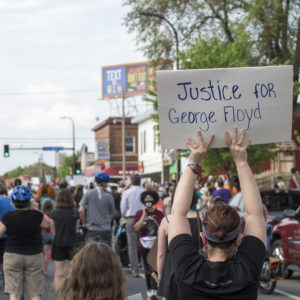For months, a constant refrain in discussions of the COVID-19 pandemic has been: follow the science, listen to the experts.
Any policymaker or politician who disagreed with experts’ dictates to impose and strictly enforce social distancing measures was chastised as an ignoramus and science denier. Anti-lockdown protesters were reckless and extreme.
Well, never mind. For many health professionals the supposedly objective science is apparently a function of the scientist’s/expert’s political worldview. Health risks that were intolerable have suddenly become manageable or immaterial in the service of a just cause.
Surgeon general Jerome Adams, Dr. Anthony Fauci and former FDA commissioner Scott Gottlieb have all warned that gatherings to protest the brutal killing of George Floyd create increased risk of spreading the new coronavirus and increasing cases of COVID-19.
We do not yet know if the two weeks of protest will prove to be the world’s largest “chicken pox parties” or if the increase in illness and deaths will be small.
Much depends on how many of the protesters were already infected, how many actually wore masks and attempted to socially distance, the transmissibility of the virus in outdoor settings, and the ages and health status of the protesters since most coronavirus infections are mild or asymptomatic in the young and healthy.
But the public health risk is not negligible.
Yet many of the experts who objected to earlier gatherings and protests now urge anti-racism protesters into the streets. Former CDC director Tom Frieden, who earlier warned against the premature relaxation of shelter in place restrictions, now minimizes the risks of large-scale protests when done for the “right” reasons.
A letter, drafted by members of the University of Washington’s Division of Allergy and Infectious Diseases and signed by more than 1,200 health professionals, makes their motivations explicit.
Public gatherings and protest should be allowed and even encouraged for favored causes — Black Lives Matter — and discouraged for disfavored causes — protests of stay-at-home orders.
The letter writers dismissed the latter because they allege the protesters were mostly racist, white nationalists. They reported that: “Infectious disease physicians and public health officials publicly condemned these actions and privately mourned the widening rift between leaders in science and a subset of the communities that they serve.”
But for the letter writers, science and public health concerns disappear for protests “prioritizing an anti-racist message.” They state that, “as public health advocates, we do not condemn these gatherings as risky for COVID-19 transmission. We support them as vital to the national public health and to the threatened health specifically of Black people in the United States.
“We can show that support by facilitating safest protesting practices without detracting from demonstrators’ ability to gather and demand change. This should not be confused with a permissive stance on all gatherings, particularly protests against stay-home orders. Those actions not only oppose public health interventions, but are also rooted in white nationalism and run contrary to respect for Black lives.”
Surely not every demonstrator protesting lockdowns that deprived them of their livelihood, kept them from attending church services, and from visiting dying loved ones was a white nationalist.
People of all races had legitimate concerns with the loss of incomes, savings and businesses that had taken them years to build. Their First Amendment rights are no less deserving of respect than people protesting the brutal slaying of George Floyd. And the science of viral transmission does not differ based on protesters’ viewpoints.
Notwithstanding the letter writers’ suggested safety measures and “guidance to support public health” during the protests, the health risks of the anti-racism protests are likely greater than the earlier protests.
The recent protests are far larger than the earlier ones, there are many more of them, videos show that many protesters are not wearing masks or distancing, and the protests feature prolonged chanting and singing, an activity that the CDC reported is associated with increased virus transmission.
People who are informed of the risks can make their own decisions about the importance of the cause and whether or not to attend.
Health professionals and experts can make their own, personal decisions too. But they have seriously undermined their standing to pronounce on public policy by highlighting that their advice is neither objective nor scientific, but actually a reflection of their political beliefs.

